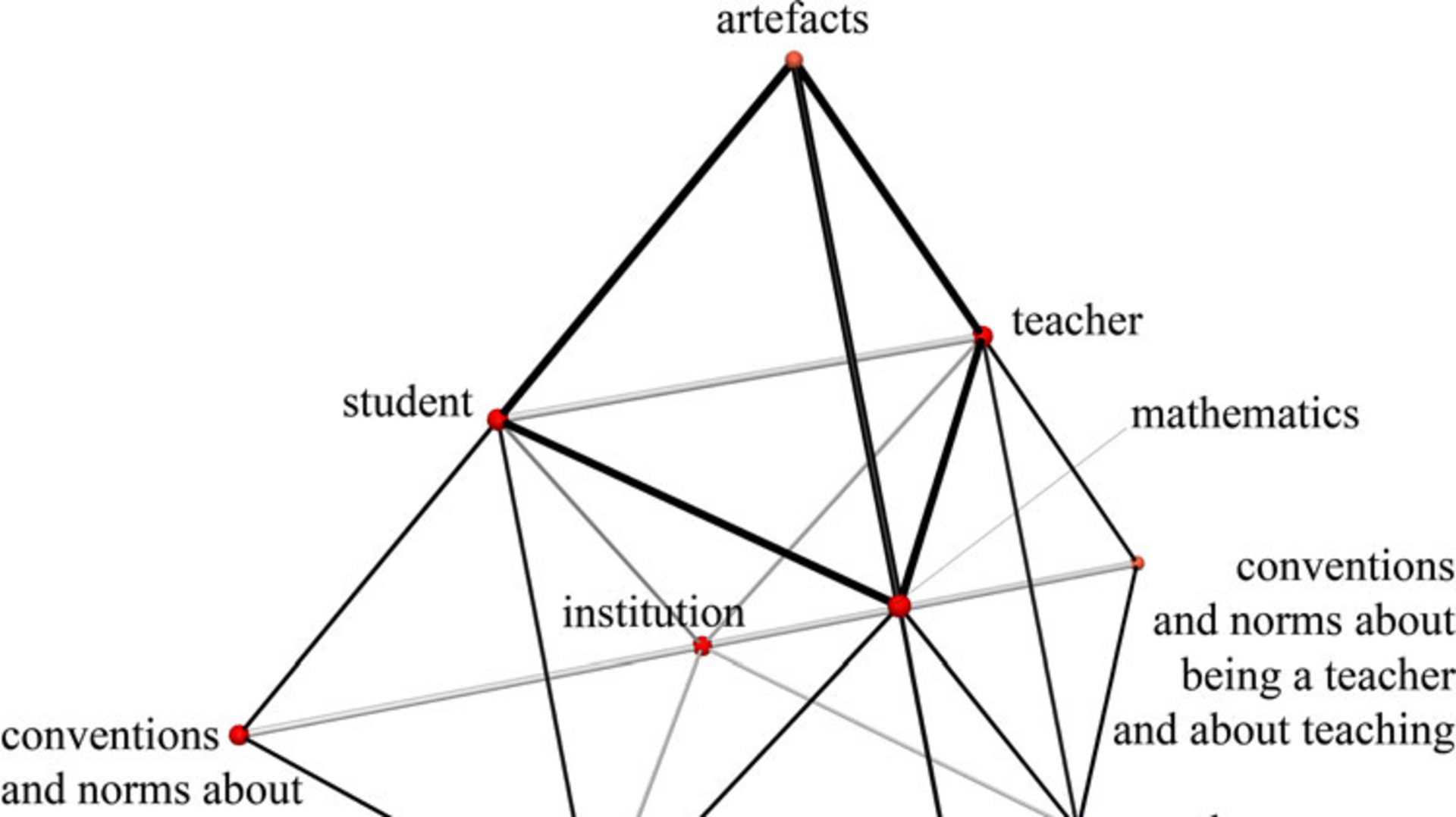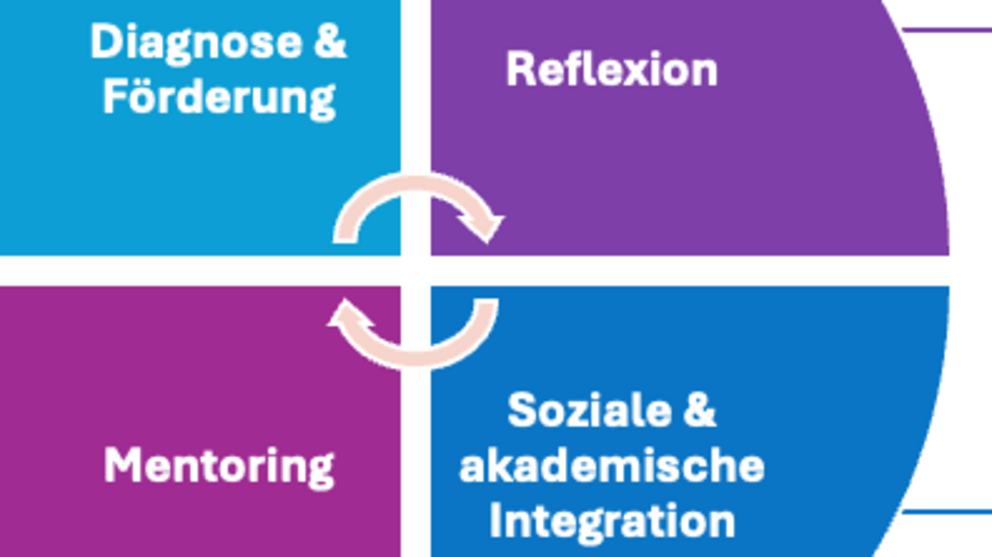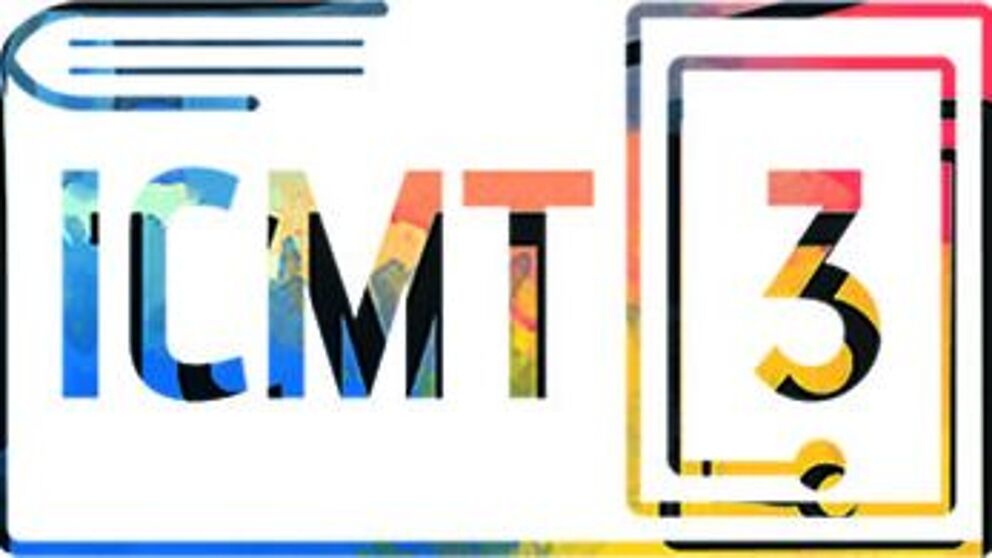The socio-didactical tetrahedron forms the general framework of my research. It is a model the comprises the essential constituents of the didactical situation as well as their mutual relationships and socio-cultural conditioning factors. Specifically, I investigate the relationships in the socio-didactic tetrahedron focusing on different artefacts: analog and digital (curricular) resources, feedback, and language.
Main areas of research (incl. topic-specific publications)
Research on textbooks and other curricular resources is my main area of interest. It covers the whole range of analog and digital curricular resources. I am primarily interested in questions relating to the use and impact of curriculum resources with a specific focus on learners as users. I am also interested in curricular aspects of textbooks and governance issues.
Topic-specific publications in chronological order
2025
Rezat, S. (2025). The quality of digital curriculum resources for mathematics in German educational policy. ZDM – Mathematics Education. https://doi.org/10.1007/s11858-025-01708-w
Pepin, B., & Rezat, S. (2025). Symposium—Towards innovative practices in mathematics education: Teachers’ and students’ choice and use of digital resources. In C. Qi, L. Fan, J. Liu, Q. Liu, & L. Dong (Eds.), Recent advances in mathematics textbook research and development (pp. 123–126). Springer Nature. https://doi.org/10.1007/978-981-97-8426-4_17
2024
Rezat, S., & Westbury, I. (2024). Textbooks and curriculum from a governance perspective. In Fourth International Handbook of Mathematics Education (pp. 601–631). Springer. https://doi.org/10.1007/978-3-031-51474-6_24
Rezat, S. (2024). Research on curriculum resources in mathematics education: A survey of the field. ZDM – Mathematics Education. https://doi.org/10.1007/s11858-024-01559-x
Rezat, S., Visnovska, J., Yan, G., Leshota, M., & Sabra, H. (2024). Topic Study Group 41: Research and development on textbooks and resources for learning and teaching mathematics. In J. Wang (Ed.), Proceedings of the 14th International Congress on Mathematical Education (Vol. 1, pp. 537–545). World Scientific. https://doi.org/10.1142/9789811287152_0065
2023
Rezat, S., & Geiger, V. (2023). The role of digital technologies in transforming student learning landscapes. In B. Pepin, G. Gueudet, & J. Choppin (Eds.), Handbook of digital resources in mathematics education (pp. 1–22). Springer International Publishing. https://doi.org/10.1007/978-3-030-95060-6_21-1
Pepin, B., Kock, Z.-j., & Rezat, S. (2023). Toward student agency in the selection and use of digital resources for learning and studying mathematics. In B. Pepin, G. Gueudet, & J. Choppin (Eds.), Handbook of digital resources in mathematics education (pp. 1–28). Springer International Publishing. https://doi.org/10.1007/978-3-030-95060-6_26-1
Gueudet, G., Pepin, B., & Rezat, S. (2023). Meta-resources: Supporting the design of mathematics teaching and learning. In B. Pepin, G. Gueudet, & J. Choppin (Eds.), Handbook of digital resources in mathematics education (pp. 1–34). Springer International Publishing. https://doi.org/10.1007/978-3-030-95060-6_36-1
2021
Rezat, S., Fan, L., & Pepin, B. (2021). Mathematics textbooks and curriculum resources as instruments for change. ZDM – Mathematics Education, 53(6), 1189–1206. https://doi.org/10.1007/s11858-021-01309-3
2020
Rezat, S. (2020). Mathematiklernen mit digitalen Schulbüchern im Spannungsfeld zwischen Individualisierung und Kooperation. In D. M. Meister & I. Mindt (Eds.), Mobile Medien im Schulkontext (pp. 199–213). Springer Fachmedien.
2019
Rezat, S., Fan, L., Hattermann, M., Schumacher, J., & Wuschke, H. (Eds.). (2019). Proceedings of the Third International Conference on Mathematics Textbook Research and Development. 16–19 September 2019, Paderborn, Germany. Universitätsbibliothek Paderborn.
Rezat, S. (2019). Die Nutzung und Wirkung von Lehr- und Lernmitteln im Deutschunterricht – Möglichkeiten der empirischen Analyse. In T. von Brand & F. Radvan (Eds.), Handbuch Lehr- und Lernmittel für den Deutschunterricht: Bestandsaufnahmen, Analysen und didaktische Reflexionen (pp. 180–191). Klett Kallmeyer.
Rezat, S., Le Hénaff, C., Visnovska, J., El Hage, S., Kim, O.-K., Leroyer, L., Sabra, H., Wang, C. (2019). Documentation Work, Design Capacity, and Teachers’ Expertise in Designing Instruction. In L. Trouche, G. Gueudet, & B. Pepin (Eds.), The 'Resource' Approach to Mathematics Education (pp. 323–388). Springer. https://doi.org/10.1007/978-3-030-20393-1_11
Rezat, S. (2019). Schulbuch? – aber bitte digital! – Den Einstieg in das Arbeiten mit digitalen Schulbüchern gestalten. In D. Walter & R. Rink (Eds.), Digitale Medien in der Lehrerbildung Mathematik: Konzeptionelles und Beispiele für die Primarstufe (pp. 215–237). WTM.
2018
Fan, L., Trouche, L., Qi, C., Rezat, S., & Visnovska, J. (Eds.). (2018). Research on mathematics textbooks and teachers' resources: advances and issues. Springer.
Rezat, S., Visnovska, J., Trouche, L., Qi, C., & Fan, L. (2018). Present research on mathematics textbooks and teachers’ resources in ICME-13: conclusion and perspectives. In L. Fan, L. Trouche, C. Qi, S. Rezat, & J. Visnovska (Eds.), Research on mathematics textbooks and teachers' resources: advances and issues (pp. 343–358). Springer. https://doi.org/10.1007/978-3-319-73253-4_16
Rezat, S., & Häsel-Weide, U. (2018). Examining peer-interaction during individual work with a digital textbook in a primary mathematics classroom. In H.-G. Weigand, A. Clark-Wilson, A. Donevska-Todorova, E. Faggiano, Grønbæk, & J. Trgalova (Eds.), Proceedings of the Fifth ERME Topic Conference (ETC 5) on Mathematics Education in the Digital Age (MEDA) 5-7 September 2018, Copenhagen, Denmark (pp. 209-2016). University of Copenhagen. http://erme.site/wp-content/uploads/2021/06/MEDA_2018_Proceedings.pdf
Rezat, S. (2018). Strategien zum Mathematiklernen mit dem Schulbuch. mathematik lehren, 211, 31–35.
2017
Fan, L., Trouche, L., Qi, C., Rezat, S., & Visnovska, J. (2017). Topic Study Group No. 38: Research on Resources (Textbooks, Learning Materials etc.). In Proceedings of the 13th International Congress on Mathematical Education (pp. 561–564). Springer. https://doi.org/10.1007/978-3-319-62597-3_65
2015
Rezat, S., & Sträßer, R. (2015). Methodological issues and challenges in research on mathematics textbooks. Nordic Studies in Mathematics Education, 20(3–4), 247–266. https://ncm.gu.se/wp-content/uploads/2020/06/20_34_247266_rezat.pdf
2014
Rezat, S. (Hg.) (2014). Mit dem Mathebuch kreativ umgehen. Fördermagazin Sekundarstufe, 36(2).
Rezat, S. (2014). Mathematikunterricht nach Buch? Mathematikunterricht mit Buch! Fördermagazin Sekundarstufe, 36(2), 5–8.
Rezat, S. (2014). (Elektronische) Schulbücher - Von Artefakten zu Instrumenten. In M. Schuhen & M. Froitzheim (Eds.), Das elektronische Schulbuch: Fachdidaktische Anforderungen und Ideen treffen auf Lösungsvorschläge der Informatik (pp. 1–19). Berlin: Lit.
Rezat, S., & Sträßer, R. (2014). Mathematics textbooks and how they are used. In P. Andrews & T. Rowland (Eds.), Masterclass in mathematics education: International perspectives on teaching and learning (pp. 51–62). Bloomsbury.
2013
Rezat, S. (2013). The textbook-in-use: students’ utilization schemes of mathematics textbooks related to self-regulated practicing. ZDM – Mathematics Education, 45(5), 659–670. https://doi.org/10.1007/s11858-013-0529-z
Rezat, S., & Sträßer, R. (2013). Methodologies in Nordic Research on Mathematics Textbooks In B. Grevholm, P. S. Hundeland, K. Juter, K. Kislenko & P. E. Persson (Eds.), Nordic research in didactics of mathematics: Past, present and future (pp. 469–482). Capelen Damm.
2012
Rezat, S. (2012). Wie wählen Schülerinnen und Schüler Schulbuchinhalte aus? Ergebnisse zur selbstständigen Nutzung von Mathematikschulbüchern. In J. Doll, K. Frank, D. Fickermann & K. Schwippert (Eds.), Schulbücher im Fokus. Nutzungen, Wirkungen und Evaluation (pp. 113–129). Münster: Waxmann.
Rezat, S., & Sträßer, R. (2012). From the didactical triangle to the socio-didactical tetrahedron: artifacts as fundamental constituents of the didactical situation. ZDM – Mathematics Education, 44(5), 641–651. https://doi.org/10.1007/s11858-012-0448-4
2011
Rezat, S. (2011). Wozu verwenden Schüler ihre Mathematikschulbücher? Ein Vergleich von erwarteter und tatsächlicher Nutzung. Journal für Mathematik-Didaktik, 32(2), 153–177. https://doi.org/10.1007/s13138-011-0028-0
Rezat, S. (2011). Interactions of teachers’ and students’ use of mathematics textbooks. In G. Gueudet, B. Pepin, & L. Trouche (Eds.), From text to 'lived' resources. Mathematics curriculum materials and teacher development (pp. 231–246). Springer. https://doi.org/10.1007/978-94-007-1966-8_12
2010
Rezat, S. (2010). Ein Beitrag zur Methodik der Schulbuchnutzungsforschung. In S. Ehlers (Ed.), Empirie und Schulbuch. Vorträge des Giessener Symposiums zur Lesebuchforschung (pp. 11–26, Siegener Schriften zur Kanonforschung, Vol. 10). Peter Lang.
Rezat, S. (2010). The utilization of mathematics textbooks as instruments for learning. In V. Durand-Guerrier, S. Soury-Lavergne, & F. Arzarello (Eds.), Proceedings of the Sixth Congress of the European Society for Research in Mathematics Education. January 28th-February 1st 2009 Lyon (France) (pp. 1260–1269). INRP. http://erme.site/wp-content/uploads/2021/06/cerme6_proceedings.pdf
2009
Rezat, S. (2009). Das Mathematikbuch als Instrument des Schülers. Eine Studie zur Schulbuchnutzung in den Sekundarstufen. Vieweg+Teubner. https://doi.org/10.1007/978-3-8348-9628-5
Rezat, S. (2009). Das Mathematikschulbuch als Instrument des Schülers - Eine empirische Studie zur Schulbuchnutzung in den Sekundarstufen. Journal für Mathematik-Didaktik, 30(3/4), 287–288. https://doi.org/10.1007/BF03339086
2008
Rezat, S. (2008). Die Struktur von Mathematikschulbüchern. Journal für Mathematik-Didaktik, 29(1), 46–67. https://doi.org/10.1007/BF03339361
Rezat, S. (2008). Learning Mathematics with Textbooks. In O. Figueras, J. L. Cortina, S. Alatorre, T. Rojano, & A. Sepúlveda (Eds.), Proceedings of the Joint Meeting of PME 32 und PME-NA XXX (Vol. 4, pp. 177-184). Cinestav-UMSNH.
2006
Rezat, S. (2006). A Model of Textbook Use. In J. Novotná, H. Moraová, M. Krátká, & N. a. Stehlíková (Eds.), Proceedings of the 30th Conference of the International Group for the Psychology of Mathematics Education (Vol. 4, pp. 409–416). Prague, Czech Republic: Charles University, Faculty of Education.
Rezat, S. (2006). The structures of German mathematics textbooks. ZDM – Mathematics Educaation, 38(6), 482–487. https://doi.org/10.1007/BF02652785
Automated feedback is currently one of the key features that distinguishes digital from analog curricular resources. I also consider feedback as an artifact and investigate its use and impact on learners' conceptual understanding in the context of the socio-didactic tetrahedron.
Topic-specific publications in chronological order
2023
Rezat, S., & Geiger, V. (2023). The role of digital technologies in transforming student learning landscapes. In B. Pepin, G. Gueudet, & J. Choppin (Eds.), Handbook of digital resources in mathematics education (pp. 1–22). Springer International Publishing. https://doi.org/10.1007/978-3-030-95060-6_21-1
2021
Rezat, S. (2021). How automated feedback from a digital mathematics textbook affects primary students’ conceptual development: two case studies. ZDM – Mathematics Education, 53(6), 1433–1445. https://doi.org/10.1007/s11858-021-01263-0
Rezat, S., Schacht, F., & Häsel-Weide, U. (2021). Challenges of making sense of tasks and automated feedback in digital mathematics textbooks. In A. Clark-Wilson, A. Donevska-Todorova, E. Faggiano, J. Trgalová, & H.-G. Weigand (Eds.), Mathematics education in the digital age: Learning, practice and theory (pp. 168–184). Routledge. https://doi.org/10.4324/9781003137580
2019
Rezat, S. (2019). Analysing the effectiveness of a combination of different types of feedback in a digital textbook for primary level. In S. Rezat, L. Fan, M. Hattermann, J. Schumacher, & H. Wuschke (Eds.), Proceedings of the Third International Conference on Mathematics Textbook Research and Development. 16–19 September 2019, Paderborn, Germany (pp. 51–56). Universitätsbibliothek Paderborn.
2017
Rezat, S. (2017). Students’ utilizations of feedback provided by an interactive mathematics e-textbook for primary level. In T. Dooley & G. Gueudet (Eds.), Proceedings of the Tenth Congress of the European Society for Research in Mathematics Education (CERME10, February 1-5, 2017) (pp. 3724–3731). Dublin, Ireland: Dublin City University, Institute of Education, and ERME. https://hal.science/hal-01950495/document
Hügel, C., Pellander, C., & Rezat, S. (2017). Vorsicht Feedback! Beim Arbeiten mit digitalen Schulbüchern bleiben Lehrende unersetzlich. Mathematik Differenziert, 2017(1), 14–21.
In the field of language and mathematical learning, my primary interest lies in genre-based approaches. A particular focus is on the genres "explaining" and "word problems". The questions in this context relate primarily to ways of fostering the learning of these genres.
Another interest in the context of language and learning mathematics is in fostering the reading of mathematical texts, primarily in the field of teacher training. Here I develop learning environments in which subject-specific reading skills can be promoted using digital technologies. The theoretical question of what characterizes mathematics-specific reading skills also plays a role here.
Topic-specific publications in chronological order
2022
Rezat, S., Malik, S., & Leifeld, M. (2022). Scaffolding Close Reading of Mathematical Text in Pre-service Primary Teacher Education at the Tertiary Level: Design and Evaluation. International Journal of Science and Mathematics Education, 20(Suppl 1), 215–236. https://doi.org/10.1007/s10763-022-10309-y
Malik, S., & Rezat, S. (2022). Linguistic features of word problems that cause difficulties for learners across the curriculum: A literature review. In J. Hodgen, E. Geraniou, G. Bolondi, & F. Ferretti (Eds.), Proceedings of the Twelfth Congress of the European Society for Research in Mathematics Education (CERME12) (pp. 1571–1578). Free University of Bozen-Bolzano, Italy and ERME. https://hal.science/hal-03745979/document
2019
Rezat, S., & Rezat, S. (2019). „… weil man Fermi-Aufgaben so rechnet“: Modelltexte als sprachliche Ressource für das Erklären von Lösungswegen bei Fermi-Aufgaben. Mathematik Differenziert, 2019(3), 30–37.
2018
Kuzminykh, K., Rezat, S., & Topalović, E. (2018). Textaufgaben verstehen: Lesen und Variieren komplexer Textaufgaben mit sprachlich-mathematischen Strategien. mathematik lehren, 211, 36–46.
2017
Rezat, S., & Rezat, S. (2017). Subject-specific genres and genre awareness in integrated mathematics and language teaching. Eurasia Journal of Mathematics, Science and Technology Education, 13(7), 4189–4210. https://doi.org/10.12973/eurasia.2017.00805a
2012
Rezat, S. & Rezat, S. (2012). Mathematische Sachaufgaben verstehen und erklären. Praxis Deutsch 233, 36–41.
My specific interest in the field of algebraic thinking lies at the intersection with extensions of number domains and algorithmic thinking. While algebraic thinking is primarily fostered in the domain of natural numbers there is much less research on its development in the domain of rational numbers. My focus here is on the theory- and empirically-based development of learning opportunities to foster algebraic thinking in these fields.
Topic-specific publications in chronological order
2023
Hefendehl-Hebeker, L., & Rezat, S. (2023). Algebra: Leitidee Symbol und Formalisierung. In R. Bruder, A. Büchter, H. Gasteiger, B. Schmidt-Thieme, & H.-G. Weigand (Eds.), Handbuch der Mathematikdidaktik (pp. 123–158). Springer. https://doi.org/10.1007/978-3-662-66604-3_5
2020
Schumacher, J., & Rezat, S. (2020). Rekonstruktion diagrammatischen Schließens beim Erlernen der Subtraktion negativer Zahlen. In G. Kadunz (Ed.), Zeichen und Sprache im Mathematikunterricht: Semiotik in Theorie und Praxis (pp. 85–112). Springer. https://doi.org/10.1007/978-3-662-61194-4_5
2019
Rezat, S. (2019). Extensions of number systems: Continuities and discontinuities revisited. In U. Janqvist, M. van den Heuvel-Panhuizen, & M. Veldhuis (Eds.), Proceedings of the Eleventh Congress of the European Society for Research in Mathematics Education (CERME11, February 6 – 10, 2019) (pp. 56–80). Freudenthal Group & Freudenthal Institute, Utrecht University and ERME.
Schumacher, J., & Rezat, S. (2019). A Hypothetical Learning Trajectory for the learning of the rules for manipulating integers. In U. Janqvist, M. van den Heuvel-Panhuizen, & M. Veldhuis (Eds.), Proceedings of the Eleventh Congress of the European Society for Research in Mathematics Education (CERME11, February 6 – 10, 2019) (pp. 4318–4325). Freudenthal Group & Freudenthal Institute, Utrecht University and ERME.
2018
Rezat, S., & Rye Ejersbo, L. (2018). Number sense in teaching and learning arithmetic. In T. Dreyfus, M. Artige, D. Potari, S. Prediger, & K. Ruthven (Eds.), Developing research in mathematics education: twenty years of communication, cooperation and collaboration in Europe (pp. 23–31). Routledge.
2011 – 2015
Hefendehl-Hebeker, L., & Rezat, S. (2015). Algebra: Leitidee Symbol und Formalisierung. In R. Bruder, L. Hefendehl-Hebeker, B. Schmidt-Thieme, & H.-G. Weigand (Eds.), Handbuch der Mathematikdidaktik (pp. 117–148). Springer.
Rezat, S. (2014). Das Permanenzprinzip erfahren. An der 1+1 Tafel und der 1x1 Tafel das Rechnen mit negativen Zahlen operativ erkunden. mathematik lehren, 183, 11–14.
Rezat, S. (2012). Rechnen mit ganzen Zahlen. Den Zahlenblick für Addition und Subtraktion schulen. mathematik lehren, 171, 23–24, 41–43.
Rezat, S. (2011). Mental Calculation Strategies for Addition and Subtraction in the Set of Rational Numbers. In M. Pytlak, E. Swoboda & T. Rowland (Eds.), Proceedings of the Seventh Congress of the European Society for Research in Mathematics Education (pp. 396–405). Rzeszów, Poland: University of Rzeszów, Poland.
I also have a specific interest in theory development and methodological issues. On the one hand, these are closely related to my other research areas but are also partly independent. The latter include, in particular, the examination of fundamental ideas of mathematics didactics as a scientific discipline.
Subject-specific publications in thematic order
Methodological contributions
Vollstedt, M., & Rezat, S. (2019). An Introduction to Grounded Theory with a Special Focus on Axial Coding and the Coding Paradigm. In Compendium for Early Career Researchers in Mathematics Education (pp. 81–100). Springer. https://doi.org/10.1007/978-3-030-15636-7_4
Hußmann, S., Rezat, S., & Sträßer, R. (2016). Subject Matter Didactics in Mathematics Education. Journal für Mathematik-Didaktik, 37(1 Supplement), 1–9. https://doi.org/10.1007/s13138-016-0105-5
Rezat, S., & Sträßer, R. (2015). Methodological issues and challenges in research on mathematics textbooks. Nordic Studies in Mathematics Education, 20(3–4), 247–266. https://ncm.gu.se/wp-content/uploads/2020/06/20_34_247266_rezat.pdf
Rezat, S. (2010). Ein Beitrag zur Methodik der Schulbuchnutzungsforschung. In S. Ehlers (Ed.), Empirie und Schulbuch. Vorträge des Giessener Symposiums zur Lesebuchforschung (pp. 11–26, Siegener Schriften zur Kanonforschung, Vol. 10). Peter Lang.
The socio-didactical tetrahedron
Rezat, S., & Sträßer, R. (2020). Die Nutzung des Sozio-Didaktischen Tetraeders in der mathematikdidaktischen Forschung. In H.-S. Siller, W. Weigel, & J. F. Wörler, (Eds.). Beiträge zum Mathematikunterricht 2020 (pp. 765–768). WTM-Verlag.
https://doi.org/10.37626/GA9783959871402.0 https://eldorado.tu-dortmund.de/bitstream/2003/39621/1/BzMu2020_REZAT-id397.pdf
Rezat, S., & Sträßer, R. (2012). From the didactical triangle to the socio-didactical tetrahedron: artifacts as fundamental constituents of the didactical situation. ZDM – Mathematics Education, 44(5), 641–651. https://doi.org/10.1007/s11858-012-0448-4
Rezat, S. (2006). A Model of Textbook Use. In J. Novotná, H. Moraová, M. Krátká, & N. a. Stehlíková (Eds.), Proceedings of the 30th Conference of the International Group for the Psychology of Mathematics Education (Vol. 4, pp. 409–416). Prague, Czech Republic: Charles University, Faculty of Education.
Fundamental ideas of mathematics didactics
Rezat, S., Hattermann, M., & Peter-Koop, A. (Eds.). (2014). Transformation - A fundamental idea of mathematics education. Springer.
Rezat, S. (2012). Fundamental ideas: A means to provide focus and identity in didactics of mathematics as a scientific discipline? In T. Y. Tso (Ed.), Proceedings of the 36th Conference of the International Group for the Psychology of Mathematics Education (Vol. 4, pp. 3–10). PME.
Handbook chapters
Hattermann, M., Rezat, S., & Sträßer, R. (2023). Geometrie: Leitidee Raum und Form. In R. Bruder, A. Büchter, H. Gasteiger, B. Schmidt-Thieme, & H.-G. Weigand (Eds.), Handbuch der Mathematikdidaktik (pp. 201–242). Springer. https://doi.org/10.1007/978-3-662-66604-3_7
Hefendehl-Hebeker, L., & Rezat, S. (2023). Algebra: Leitidee Symbol und Formalisierung. In R. Bruder, A. Büchter, H. Gasteiger, B. Schmidt-Thieme, & H.-G. Weigand (Eds.), Handbuch der Mathematikdidaktik (pp. 123–158). Springer. https://doi.org/10.1007/978-3-662-66604-3_5
Rezat, S., & Geiger, V. (2023). The role of digital technologies in transforming student learning landscapes. In B. Pepin, G. Gueudet, & J. Choppin (Eds.), Handbook of digital resources in mathematics education (pp. 1–22). Springer International Publishing. https://doi.org/10.1007/978-3-030-95060-6_21-1
Pepin, B., Kock, Z.-j., & Rezat, S. (2023). Toward student agency in the selection and use of digital resources for learning and studying mathematics. In B. Pepin, G. Gueudet, & J. Choppin (Eds.), Handbook of digital resources in mathematics education (pp. 1–28). Springer International Publishing. https://doi.org/10.1007/978-3-030-95060-6_26-1
Gueudet, G., Pepin, B., & Rezat, S. (2023). Meta-resources: Supporting the design of mathematics teaching and learning. In B. Pepin, G. Gueudet, & J. Choppin (Eds.), Handbook of digital resources in mathematics education (pp. 1–34). Springer International Publishing. https://doi.org/10.1007/978-3-030-95060-6_36-1
Hattermann, M., Kadunz, G., Rezat, S., & Sträßer, R. (2015). Geometrie: Leitidee Raum und Form. In R. Bruder, L. Hefendehl-Hebeker, B. Schmidt-Thieme, & H.-G. Weigand (Eds.), Handbuch der Mathematikdidaktik (pp. 185–219). Springer.
Hefendehl-Hebeker, L., & Rezat, S. (2015). Algebra: Leitidee Symbol und Formalisierung. In R. Bruder, L. Hefendehl-Hebecker, B. Schmidt-Thieme, & H.-G. Weigand (Eds.), Handbuch der Mathematikdidaktik (pp. 117-148). Springer.
Rezat, S., & Sträßer, R. (2014). Mathematics textbooks and how they are used. In P. Andrews & T. Rowland (Eds.), Masterclass in mathematics education: International perspectives on teaching and learning (pp. 51–62). Bloomsbury.
Projects
Keynotes
29.09.2023 | GDM Working Group on Mathematics Education and Digital Tools, Freiburg Title: (Understanding learning processes with) digital mathematics textbooks with automated feedback - status quo and perspectives |
14.11.2022 | Fourth International Conference on Mathematics Textbooks Research and Development (ICMT4) in Beijing, China Title: Students' learning of mathematics from text(books) and other curriculum resources |
08.02.2019 | Eleventh Congress of the European Society for Research in Mathematics Education (CERME11) Title: Extensions of number systems: continuities and discontinuities revisited |
24.11.2014 | Interdisciplinary conference "The textbook as a medium of knowledge: production - representation - reception" at the Institute of Sociology at Johannes Gutenberg University Mainz |
20.02.2014 | Interdisciplinary conference "The electronic textbook - didactic requirements and ideas meet proposed solutions in computer science" at the University of Siegen Title: (Mathematics) textbooks - from artefacts to instruments |



